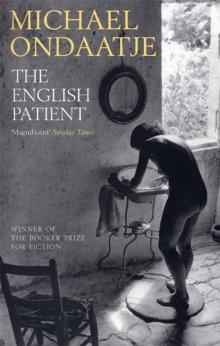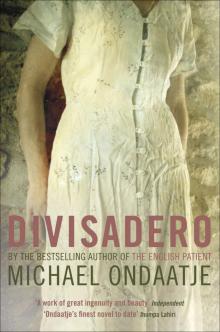- Home
- Michael Ondaatje
Divisadero Page 19
Divisadero Read online
Page 19
But during the capsizing months on either side of the two weddings, he felt everything change. He knew that while Lucette did not wish to harm her sister, she would enter the bedroom of Thérèse’s intended and favour him in the dark. They would make love disguised within the shell of a travelling diligence. She would be in the garden shower—under which she had bathed as a child—at a certain hour and would tie the gate closed with a string or ribbon, knowing he would be there, already undressed. They synchronized their journeys to Paris, and drank absinthe and slept together drunk within their hotel room. They consumed dark coffee and stayed up all night writing. They were cautious, and yet nothing kept them apart.
Besides, she was already married to the sweet and lackadaisical Henri Courtade, was she not? And yet here was her sister’s suitor, languid and brilliant, quick-hearted, for he was humorous with all of her family, not just her (which Lucette loved in him), deceiving them all so that he could be close to her.
‘If you will not break off your engagement,’ Pierre Le Cras had warned her, ‘and marry me, then I will slip into the stockade of your family in any way I can.’ ‘I dare you,’ she had responded. ‘I shall propose to Thérèse,’ he had said, ‘and if she will not have me, I will become an architect and build a house for your father, or become the gardener for this estate.’ ‘Tante, our neighbour, keeps an eye on the garden.’ ‘Then I will become your father’s biographer.’ ‘He wishes for no biography, he’s famous enough.’ ‘Then I’ll make you pregnant and hell will break loose.’
There were scarcely any rules for the two of them. Or there was only one—whatever allowed them to be together. ‘If I have a child, then it must be yours,’ she said. That became the second rule.
She accepted everything about him, ached for him.
I want to ... Let me. This.
Here?
Yes.
She knelt on the turned earth, they were in someone’s field, he came into her mouth, and she stood up again. Around them suddenly was the rest of the world.
Lucien was halfway up the steps to the garden tower when he glanced down and saw his very pregnant daughter bathing under the shower, shielded partially by a birch. Few used the shower anymore, not since the children had grown up. When they were young the whole family bathed there during summer months. Lucien paused and watched the quick movement of Lucette’s hands as she soaped herself, and all at once, in that moment he became happy and was at ease. He accepted whatever the love was, and wherever it came from. He had at one time surely been as foolish as they were. What did it damage? There was in the end an order, even to this.
He was certain his daughter was pregnant by Pierre but things would be all right. A torch of desire sometimes sprang up in the strangest half-lit rooms, but a family could somehow envelop and contain that. He knew this from his own life. He continued up the steep iron stairs, looked down once more, and saw Lucette run her wet hands through her light brown hair, darkening it. Then she seemed to hear something and she turned her back and bent over, and the slim naked body of Pierre Le Cras stepped between Lucien and her.
What had been innocent—a celebration!—abruptly made him a voyeur. His daughter’s forearms and open palms were flat against the mildewed wall as Pierre tugged her white hips and shoulders towards him, his body digging into her again and again, and again as if she were the very centre of the universe. Lucien thought of her small hand brushing away the erasure rubbings from his pages.
He turned quickly to go down the flight of stairs to the level of the earth, to the normal perspective of a human. Ten metres up, you saw over walls, witnessed an unexpectedly revealed house. You were a writer in mid-air. It was what Japanese artists called the ‘lost-roof technique.’ Cursed with omnipotence, he had seen the blunt truth of their romance. The girl he had carried in his arms during a childhood nightmare now had the needs of an adult. It was something a father should not have shared, although as a young man he had bathed with this same person under that very same water spout.
She had been as tall as his knee.
There were nights when Lucien startled himself awake at his daughter’s wildness. How had she, the one daughter he had known as obedient and well mannered, evolved into such a person? Was it simply that Pierre was the man she demanded above every other principle? There was this live coal of desire on her tongue that had altered her, so that she could no longer be sheltered by the husk of a family. And he realized he loved even more this proud indelible daughter, his Flammarion companion, who had leapt beyond him into the life of this dangerous stranger, a man he was unable to like except through the knowledge that Lucette had placed herself in the cup of his hand, just as she had bent over and moved back into his body, defenceless with pleasure in the garden shower.
Sometimes truth is too buried for adults, it can be found only in hours of rewritings during the night, the way metal is beaten into fineness. Whereas children are a generation with immediate clarity. He could not comprehend how the sequence of poems by Pierre had been so powerful and believable. He did not understand how his two daughters seemed so close and yet uncareful with each other. Once he had pockets full of wisdom to give his children. Had he not been the one who taught them where exactly to climb a fence, or how much to feed a dog?
Perhaps he’d ‘done enough’ in his life, as a novelist said to him in a salon before the war. She meant he had written enough to be significant, or at least he had as much chance of being significant as one could expect in a literary career. Even then it was not what he wanted to be comforted by. Fame was not what he wanted, fame was as foreign to him now as it had been when he was twenty. He’d protected himself from it by becoming a splintered creature. (When he made journeys, he would go with one friend, never two, then bid farewell and meet the second acquaintance in Lapalisse perhaps and walk with him into Burgundy.) Anyway, he had been dancing with that bird-slim novelist at a salon on the avenue Hoche, one of her hands on his shoulder, the other a light goose-wing at his neck. These were gestures towards possibility, and he had often imagined her as a lover. She was a graceful writer who had her own honours in her career. But for Lucien, writing was a place of emergency. He wanted what he had done those first few times, without awareness, when the page was a pigeonnier flown into from all the realms one had travelled through. There had been the gathering then, the thrill of diversity. There was no judgement. He had not sought judgement when he began to write, but it had somehow become crucial to his life. When all he had wanted was to dance with no purpose, with a cat.
Le Bois de Mazères
Years earlier, before the death of Lucien Segura’s mother, the belfry of the church in Barran was renovated. Roman, agile for such a thickset man, was one of those hired to work on the fifty-metre height of it, where he would receive better money than could be earned anywhere else. Hanging within a rope harness, Roman hammered loose and ripped away the rotten sheeting, revealing gradually the skeleton of the twisted tower. Then he and others, their bodies roped to pulleys, entered the old belfry and in the darkness strengthened the structural braces, and laid new octagonal floors at each level.
They worked inside the tower for two months, while the high gales and snow raced over the plain and swirled among them. Then they came into sunlight and hauled up fresh sheets of wood and rebuilt the outer structure. Roman at this time was as hazardous as the work he was doing. He had rarely worked alongside others. When he returned to the ground he’d swagger, as if drunk, free at last of the tension of balance. All day he had hung in a bat harness or stood on a single spike on the edge of the air, while around him was all the universe of the Gers. He could see the many brown paths that wove towards the forest, and Auch twenty kilometres away, and the route he took each night on his horse in the darkness back to the farmhouse. Arriving around eight at night, he would eat a meal with Marie-Neige, and be awake by five the next morning to return to Barran. If not for those solitary night rides, if not for Marie-Neige and their quiet talk as he slippe
d into sleep, he felt he would have gone mad. By seven the next morning he was attached once again to the structure, riding it, clinging to wood that had been cut down in the thirteenth century. All that winter he worked against the sloped roof. Still, the most difficult hours were when he came down before darkness and there was the need to test himself on the ground in a different way, as if to hold on to the earth.
During the night, snow came in the darkness, and Roman and Marie-Neige woke to a brief white land. In the Gers it snowed and then melted with the first sunlight, so the green landscape of fields and forests soon returned. But when Roman rode towards Barran, it was still early, and his horse left a path in the whiteness that arced up to the forest. He always took the route through the Bois de Mazères. Travelling this way, through the great acreage of trees, he could reach Barran in less than an hour. He rode, the low branches with their new weight grazing his shoulders, so snow fell onto his lap, his thighs, the rump of the horse. Eventually he let go of the reins so the horse selected its own route, and would remember it when they returned in the darkness.
Then Roman would lie back and look up into the green cross-hatched tapestry. For those minutes, lost under the shifting world, he was a boy, doing what he had done as a boy. The reins were loose at his knees and he thought of nothing. Because he was a man who could not read and who rarely spoke except when there was a necessity, every gesture that occurred around him magnified in meaning, and was full of angles of introspection. A silent hesitation by Marie-Neige, or the tone of a sentence from an authority at the church in Barran, said almost more than was necessary. Thus the low, easy swoop of a magpie, with some bright object in its mouth, turned slowly within him like something grinding in a mill.
Bird life had hardly been awake when he’d entered the trees. A first chirp from above had fallen like a splash down towards him. But now the oaks and beech trees repeated melodies and verbose plans, so it felt as if he were moving through a marketplace. For Roman, a cow or a pig or a scared hound revealed itself with sound and posture—they were no different from humans. He could read the expression that told of a broken claw or a thirst. But birdsong was the great mystery he had come to love. He aligned himself within it, its vast architecture, which contained all forest life and the life of a sky. Wherever Roman worked, he had found time in his day to enter a copse or forest.
The light of the open field hit him as he left the trees, and he sat up on the horse and saw in the distance the twisted belfry of Barran. He was a man who appeared to ignore everything around him. Whenever Lucien spoke with him, asking him what he thought were essential questions, Roman seldom gave an answer if he felt it could be discovered or pointed to instead. It was only when Lucien had retreated from all of them, his face cut by those splinters of glass, that Roman felt close to him. Since his marriage he had never trusted strangers. In a narrow street, coming upon others, he would stiffen so they could pass around him. He owned almost nothing, but would have fought a legion to protect the one or two or three possessions he had— some furniture, including a bed and a table, the two horses, the pigs he boarded—as well as the things he felt he had a right to, the arms of his wife, the path he took in the forest. Everything else was a stranger to him, possibly against him.
At night, when he returned to the farmhouse, the two lamps Marie-Neige had lit and hung above their door frame allowed him to leave the roadway and ride across the fields, and as he came over the rise, up out of the valley, and saw them, he gave a long howl like that of a wolf, and she would know he was near—so that sometimes Lucien and his mother or sometimes Lucien’s fiancee would believe there was a creature skirting the two farms. No, there are no wolves, Marie-Neige would say if asked, never revealing the source, and they never believed her certainty. It was in a way the tenderest communication between her and her husband.
At Barran, Roman tied on the leather apron, with its pouch for nails and hoop for a hammer, and ignoring everyone climbed the ladder up the side of the belfry until he was back in solitude once more, with nothing but a jarring wind and the echo of his hammering and voices that shouted below him like the barking of foxes. It reminded him of the charivari, those hoots in the darkness. Such wordless events and small gestures converged on Roman in this way. Up there, high on the belfry, he recalled the image of that swooping magpie with something stolen glittering in its mouth, as if it had been a sign.
There was a suckling child carved out of wood in a nearby church at Monteyzal that he took. The embroidery on kneeling stools hidden among pews, that he cut and pulled free. Portraits of saints from walls. A marble bowl. A rug. An ebony cross. A felt-covered ledger. In Fontanilles and Douelle and Brouelle and Malemort and Senilla—everywhere he rode, he fell upon ancient churches empty at midnight, alone in their small grandeur, unheated and in darkness. So there were nights when he did not travel the simple twenty kilometres to the farmhouse, but rode into those villages on the periphery of the great forest and entered churches, slept in their darkness, and took what he needed or what he felt the churches did not need, the lace, the rims of silver from a portrait, a graven image; he brought them to a clearing in the Bois de Mazères, and waited until there was faint light. Frost covered everything. The passereaux and the rapaces were awake already with tentative songs in the dark. He dug up his previously buried tarpaulin and added to the cache the new things he had taken. He would trade such objects for plants and grain and clothing.
The final stage of work on the belfry was the slate covering. Slates had been brought from the Angers region and were to be installed without overlap. The men hammered them on with rifled copper nails. Ten metres below the cross and the rooster, Roman balanced himself on a single spike. He could see the forest of Mazères in the northwest, shaped like a green cloverleaf in all the whiteness, for snow fell deep and unseen into those trees. Whatever he had taken from the churches was buried there, save for a painted wooden flower he had pulled off a carved saint’s blouse for Marie-Neige, a stolen thing like a live alouette in his pocket.
He paused in his hammering, and looking into the distance saw Marie-Neige on horseback. Even with all that space between them he could recognize her shape as she and the animal nudged forward on the last half-hour of their journey to Barran. She would never get to tell him, after the fight that occurred shortly afterwards, why she had come to Barran that day, what news she wished to bring him. He saw her foreshortened figure tie up the horse and begin walking towards a group of carpenters. He imagined the men gazing openly at her; she was the only woman there, it must have been brazen. Then they had looked up, pointed to the tower, and he heard laughter. For a long time he did not move, high on this strange tower that people insisted had been created originally by a sudden and perverse wind or by the madness of a roofer in love.
Fields
Whenever Marie-Neige returned from visiting her husband in prison, she walked the periphery of their two fields—one that surrounded the barn like a horseshoe, and a larger one that sloped uphill. Roman had boarded horses and pigs for neighbouring farmers, and this had brought in minimal subsistence. Now, with him in jail, she could hardly keep up. But walking the property at dusk made its possibilities clearer. She could live on what she grew within the horseshoe and turn the larger field into a market garden. But she had to learn how to replenish the fields. The animals they boarded had ripped open the earth. So she began to fork manure and vegetable remains and fire ash into the earth, and took the wagon to the slaughterhouse in Marseillan to bring back offal and the remnants of carcasses, which were like gold. Needing a darker, loamier soil, she sprinkled chimney soot over the rows where she had planted cabbage, dragged lime and ammonia through the claylike soil, and used cow dung where it was sandy and horse manure where it was chalk. Some of this she already knew. The rest she discovered in a monograph she borrowed from Lucien’s library that showed how earth was renewed in an old battle zone. All this reminded her of the book where Cornelius tried to grow a perfect black tulip.
She bundled weeds at the edge of the larger field and let them dry, and a week later heaped them all into a fire. The acrid smell drifted downhill to Lucien’s house and slipped into his workroom, so that he came to the window and watched her in the distance, outlined by smoke and flame. She trod seeds into the earth instead of broadcasting them with her hands. They called this plombage in Lucien’s military monograph. She cut down brush and left just a few fruit trees along the fences. In the new vegetable gardens, she discouraged sparrows by laying out white cotton along the seedbeds, and dissected earthworms and dipped them in nux vomica, then slipped them into mole holes. She was as gentle with seedlings as she was brutal with pests. She loosened the moist earth and carried the bundle of shoots in her cupped hands as if it were a fallen bird to be returned to its nest. She saw her work now as a path through the seasons, seeding onions and celery between February and April, leeks and winter cabbage from May to July.

 In the Skin of a Lion
In the Skin of a Lion The Cinnamon Peeler
The Cinnamon Peeler The Conversations: Walter Murch and the Art of Editing Film
The Conversations: Walter Murch and the Art of Editing Film Anil's Ghost
Anil's Ghost The English Patient
The English Patient Coming Through Slaughter
Coming Through Slaughter Handwriting
Handwriting Warlight
Warlight The Cat's Table
The Cat's Table Running in the Family
Running in the Family The Collected Works of Billy the Kid
The Collected Works of Billy the Kid Divisadero
Divisadero